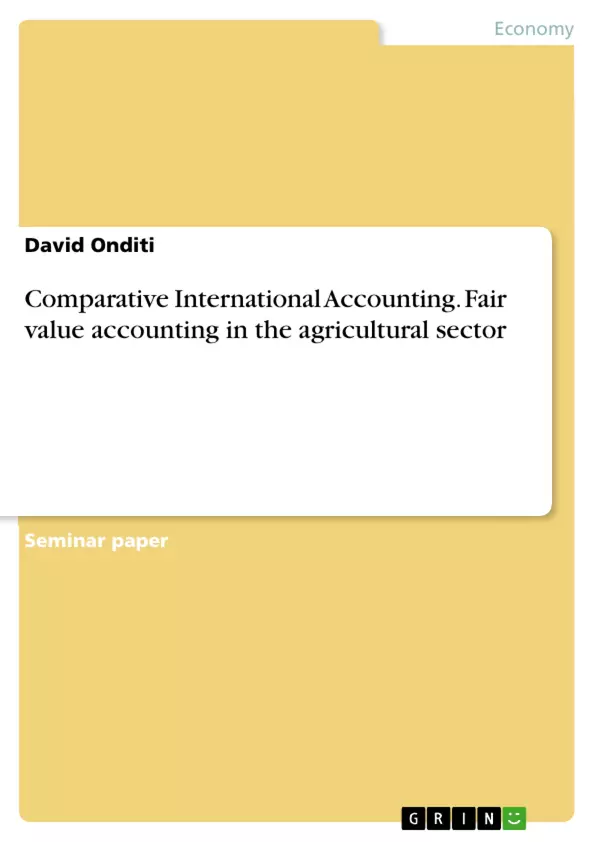The changes that are taking place due to the globalisation of economies have led to a trend towards accounting standards of different countries being standardised. The accounting standard commonly used in the agricultural sector in IAS 41. IAS 41 is aimed at regulating the agricultural sector, which has been outside the discussions of accounting due to the lack of infrastructure and tradition for divulging or preparing its financial statements. The biological assets, according to IAS 41, should be valued at their fair value except for the cases where it would be impossible to estimate their value reliably. The main objective of this work is to determine how fair value accounting can be applied in the agricultural sector.
The research will focus on the following research questions: Has IAS 41 enhanced the international comparability of accounting practices in the agricultural sector? How can biological assets fair value be measured, where there is no active market, in a reliable way in accordance to IAS 41?
Inhaltsverzeichnis (Table of Contents)
- 1.0 Introduction
- 1.1 Background
- 1.2 Objective of study and research questions
- 2.0 Literature review
- 2.1 Fair value-based valuation for biological assets
- 2.2 Biological assets concepts
- 3.0 Methodology
- 3.1 Introduction
- 3.2 Research design
- 3.3 Data collection and analysis
- 4.0 Findings and discussions
- 4.1 Comparability of accounting practices in the agricultural sector
- 4.2 Fair value measurement of biological assets
- 5.0 Conclusion and recommendations
Zielsetzung und Themenschwerpunkte (Objectives and Key Themes)
The study aims to understand the application of fair value accounting in the agricultural sector, specifically focusing on the challenges and implications of using IAS 41 for biological asset valuations. The research explores the comparability of accounting practices in the agricultural sector and investigates how fair value measurement can be applied effectively.
- Fair value accounting in the agricultural sector
- Comparability of accounting practices
- Challenges of applying fair value to biological assets
- The role of IAS 41 in regulating the agricultural sector
- The impact of globalization on accounting standards
Zusammenfassung der Kapitel (Chapter Summaries)
The introductory chapter provides context by discussing the trend towards globalized accounting standards and the role of IAS 41 in regulating the agricultural sector. It highlights the importance of fair value accounting in this context and introduces the challenges associated with valuing biological assets.
The literature review delves into the theoretical framework of fair value-based valuations for biological assets, examining the concepts and definitions relevant to the agricultural sector.
The methodology chapter outlines the research design, data collection methods, and analysis techniques employed in the study.
The findings and discussions chapter focuses on the comparability of accounting practices in the agricultural sector and the challenges and opportunities associated with fair value measurement of biological assets.
Schlüsselwörter (Keywords)
The research focuses on fair value accounting, IAS 41, agricultural sector, biological assets, comparability of accounting practices, fair value measurement, globalization, accounting standards, financial statements.
Frequently Asked Questions
What is IAS 41 and why is it important for agriculture?
IAS 41 is an international accounting standard specifically designed to regulate the agricultural sector, focusing on the valuation and disclosure of biological assets.
What are biological assets according to IAS 41?
Biological assets include living animals or plants (such as livestock or crops) that are managed by an entity as part of agricultural activity.
How is "fair value" applied to biological assets?
Under IAS 41, biological assets should generally be valued at their fair value less costs to sell, rather than historical cost, to reflect their current market value.
What happens if there is no active market for a biological asset?
If an active market is unavailable, entities must use alternative reliable estimation methods to determine fair value, which remains one of the primary challenges of the standard.
Has IAS 41 improved comparability in international accounting?
The research explores whether the standard has successfully harmonized global accounting practices in agriculture, which was previously characterized by a lack of infrastructure for financial reporting.
- Citation du texte
- David Onditi (Auteur), 2019, Comparative International Accounting. Fair value accounting in the agricultural sector, Munich, GRIN Verlag, https://www.grin.com/document/477466



